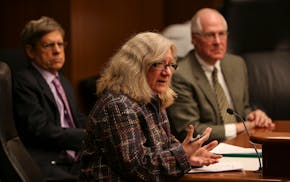Opinion editor's note: Strib Voices publishes a mix of commentary online and in print each day. To contribute, click here.
•••
One of the most memorable celebrity encounters of my career took place at Minnesota's Mayo Clinic and was completely accidental.
I was at the Rochester-based medical center on a health policy reporting assignment roughly 15 years ago. A Mayo communications staffer was escorting me to an interview through one of the employees-only pedestrian tunnels that offer a shortcut between campus buildings. The tunnel was empty other than two people ahead of us: an older gentleman accompanied by another communications staffer.
My own guide hustled us forward to join them, with the idea to introduce a journalistic contact to the other employee. We quickly caught up to them and I remember thinking, "Wow, that older guy looks a lot like Arnold Palmer," and then, "Holy smokes, that is Arnold Palmer."
The other staffer, who must have been drafted to help Palmer avoid crowds, looked horrified. Patient privacy is sacrosanct, especially at a medical center whose patients include the wealthy and well-known. Yet here was a journalist standing face-to-face with the golf legend. I could see both staffers sweating, swallowing hard, worrying about patient privacy laws and wondering how they were going to explain this to their boss.
Palmer looked tired and his shoulders sagged as he realized what had happened. Even if it was routine care that brought him to Mayo, exams and tests are no fun. Empathy was in order. It was an easy call to say, "Mr. Palmer, I won't report that you're here. But I hope I can shake your hand and tell my dad, who's a golf nut, that I met you."
He gave me a grateful smile, shook my hand and we all went on our way.
Palmer passed in 2016. I'm not a golfer, so he rarely comes to mind other than ordering the iced-tea-and-lemonade beverage that bears his name. But over the weekend, Palmer's memory and his surviving family sadly fell victim to the nation's coarsening political dialogue.
On Saturday, former President Donald Trump appeared at a rally in the Pennsylvania town where Palmer was born. In his remarks, Trump thought it would be sporting to lionize the size of the dead golfer's genitalia.
For that he owes Palmer's surviving widow and family an apology, though it's unlikely one is forthcoming. But imagine this from the family's perspective. Palmer has been gone for eight years. Now suddenly, their beloved husband, father and grandfather is back in the public eye because of a random, sexualized comment by Trump, who likely has the world's biggest megaphone.
Some commenters have shrugged it off. "I mean it's just par for the course. He speaks in hyperbole. He gets his crowds riled up," Chris Sununu, the Republican governor of New Hampshire, told the Associated Press.
This is not a healthy reaction. We ought to expect more than sex organ jokes from presidential candidates, especially when the "humor" is likely to inflict pain or embarrassment. It shouldn't be too much to expect a presidential candidate to think through how his remarks might hurt innocent people, like the Palmer family, or to understand how deeply inappropriate this language is for a general audience.
To those asking why Trump would say something like this, the answer is obvious. He apparently thought this attempt at locker room humor would underscore his bona fides with male voters. Trump's also a golfer, and the comment made it sound like he was a good enough player to have gossiped with professionals of Palmer's caliber.
The more important question is this: How did we get to a place where this is the language that those vying for the nation's highest office think is appropriate?
I'm old enough to remember when a minor scandal erupted after former President George W. Bush didn't realize he was on a hot microphone and used a cuss word to denigrate a New York Times reporter. Current President Joe Biden caught a lot of flak when he was vice president and called the Affordable Care Act's passage a big bleeping deal.
It's unfortunate that the pushback these remarks met has faded away. Voters have a right to expect their leaders to communicate in a professional way. In the workplace, there should be zero tolerance for a reference to the size of someone's genitalia. Employees with an eye on promotion also limit profanity, especially around the boss, for good reason.
Yet the standards have slipped precariously in politics, and it isn't just one party that stands guilty of this.
During his Democratic National Convention speech in August, former President Barack Obama used hand gestures to slyly suggest that Trump's obsession with crowd size actually was rooted in Trump's anatomical insecurities.
Minnesota Gov. Tim Walz, who is now Vice President Kamala Harris's running mate, throws the word "damn" around a lot. In August, a Star Tribune letter-to-the-editor author admonished him, asking him to "watch your language when speaking. Students are watching and learning from you. A governor, former teacher and coach doesn't need to swear in every speech."
Obama and Walz need to do better, but their remarks pale in comparison to Trump's odious comment about Palmer. A cleanup in our national political conversation is clearly in order.
When I met Palmer that day at Mayo years ago, he deserved the decency to be left alone. The legendary golfer's family deserved the same, and it's disturbing that a former and would-be president failed to understand this.

Fierce but compassionate mental health advocate will be missed
Burcum: 'Big Beautiful Bill' takes hatchet to health care
Burcum: 'Why would we make it harder to get help' for addiction?
!["Republicans want to overturn this newfound eligibility [for undocumented immigrants to enroll in MinnesotaCare], which was passed by DFL majorities i](https://arc.stimg.co/startribunemedia/XZLGO62KH5G6DHR55ER5IECZAY.jpg?h=91&w=145&fit=crop&bg=999&crop=faces)
Burcum: Don't rush the decision on undocumented immigrant health coverage


